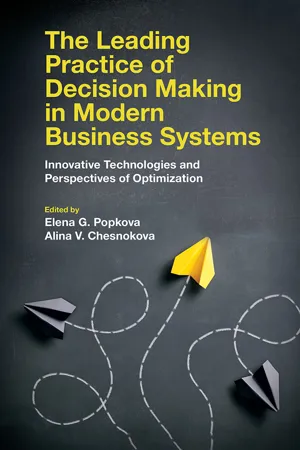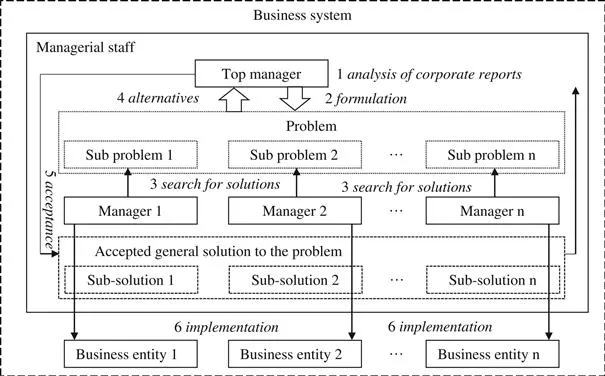![]() PART I
PART I
GENERALIZATION OF THE EXISTING EXPERIENCE OF DECISION MAKING IN MODERN BUSINESS SYSTEMS![]()
Chapter 1
THE RUSSIAN MODEL OF DECISION MAKING IN MODERN BUSINESS SYSTEMS
Aleksei V. Bogoviz1, Rustem T. Yuldashev2, Margarita A. Menshikova3, Olga V. Titova,4 and Ekaterina S. Lebedeva5
ABSTRACT
Purpose
The purpose of the work is to develop a Russian model of decision-making in modern business systems.
Methodology
The method of modeling of socioeconomic systems and the method of formalization for graphic presentation of results of modeling are used.
Conclusions
A Russian model of decision-making in modern business systems is developed; it reflects not only the structure of managerial tools and peculiarities of its communication with business entities, that is, internal hierarchy of the business system, but also the algorithm of decision-making in modern Russian business systems, which includes six consecutive mandatory stages. The presented model showed simplicity and clarity of hierarchy of managerial staff and the business system on the whole. Due to this, authorities and responsibilities are not doubled – each business entity under the management of functional manager performs strictly determined business processes. This allows dividing any problem into a lot of subproblems, which are effectively solved by the corresponding functional managers on the basis of the mechanism of labor division. Due to this, alternatives are selected over a short period of time.
Originality/Value
It is determined that, despite multiple advantages, connected to logical succession of the process of making of managerial decisions in modern business systems, the Russian model of this process has drawbacks that are caused by stage-by-stage and fragmentary solution of problems and implementation of decisions, as well as by underdevelopment of feedback and marketing activities.
Keywords Decision-making; business system; management; manager; optimality; Russia
JEL Classification D81; M21
Introduction
Modern Russian practice of making of managerial decisions in business systems has a special interest for economic science and practice due to several reasons. First, Russia is peculiar for unique geographical location in Europe and Asia, which leads to combination in the Russian practice of making of managerial decisions of the elements of the European and Asian models. Studying this symbiosis allows reconsidering the existing regional models and giving a new impulse to their development with emphasis on their advantages.
Second, uniqueness of modern Russia’s economic system consists in the fact that it has a high level of socioeconomic development and, at the same time, shows high rate of economic growth – that is, it possesses features of developed and developing countries. That’s why its experience could be used for both categories of countries. Third, Russia has a diversified structure of economy with developed industry and service sphere. Due to this, the practice of making of managerial decisions in business systems is formed in a diversified business environment.
Fourth, Russia is a vivid example of countries forming market economy. Transition from dominating state property to private property for business systems causes specificity of the practice of making of managerial decisions. Incompletion of market transformations causes peculiarities of marketing practice of business systems. These peculiarities and features of the modern Russian practice of making of managerial decisions emphasize topicality of its modeling not only for further research but also for development of other models that are built on the basis of the regional principle and the principle of the level of development of modern socioeconomic systems. Based on this, the purpose of the chapter is to develop the Russian model of decision making in modern business systems.
Materials and Method
The theoretical basis of the chapter includes the works of modern scholars that are devoted to the Russian practice of making of managerial decisions: Al-Hadi, Al-Yahyaee, Hussain, and Taylor (2018), Bae, Masud, and Kim (2018), Belouettar, Kavka, Patzak, Pricl, and Daouadji (2018), Bobillo, Rodríguez-Sanz, and Tejerina-Gaite (2018), Gaitán, Herrera-Echeverri, and Pablo (2018), Keay and Zhao (2018), Krivtsov (2014), Krivtsov (2015), Krivtsov, Polinova, Ivankina, Chubarkova, and Prokubovskaya (2016), Marques, de Sousa Ribeiro, and Barboza (2018), Popkova (2017), Popkova, Tyurina, Sozinova, Serebryakova, and Lazareva (2017), Popkova, Ragulina, and Bogoviz (2019), Popkova, Gornostaeva, and Tregulova (2018), Singareddy, Chandrasekaran, Annamalai, and Ranjan (2018), Sukhodolov, Popkova, and Litvinova (2018), Thomsen (2016), and Veselovsky, Izmailova, Bogoviz, Lobova, and Alekseev (2017).
As a result of content analysis of these publications, the following peculiarities of modern Russian practice of decision making in business systems were determined:
- functional organizational structure: presence of top manager and several functional managers, who report to the top manager; each of them is responsible for management of a certain components of the business system (finances, production, sales, etc.);
- independent decision making by the business manager without participation of employees: systemic collection of feedback is not envisaged, all decisions are discussed within the managerial staff, and the final decision is made by the top manager; and
- founding primarily on internal information with insufficient attention to marketing: systemic marketing studied are not performed, but there’s regular (every month, three months, year) analysis of corporate reports, internal monitoring, and control, in the course of which current problems of the business system are determined.
A drawback of the existing scientific literature is emphasis on separate peculiarities of the modern Russian practice of decision making in business systems, while the general model of this process remains unclear. This chapter fills the gap in the system of the existing scientific knowledge. For this, the method of modeling of socioeconomic systems and the method of formalization of graphic presentation of modeling results are used.
Results
Studying the modern Russian practice of making of managerial decisions in business systems allowed compiling the following conceptual model (Figure 1).
Figure 1.The Russian Model of Decision Making in Modern Business Systems. Source: Compiled by the authors.
The model in Figure 1 reflects not only the structure of managerial staff and peculiarities of its communication with business entities, that is, internal hierarchy of business system, but also the algorithm of decision making in modern Russian business systems, which has six consecutive mandatory stages.
The first stage of decision making in modern business systems, according to the compiled Russian model of this process, is analysis of corporate reports by the top manager. At this stage, economic results of activities of the business system for the set time period (calendar month, three months, year) are compared to the target results that are given in the business strategy. Failure to achieve the target results shows certain problems with the business system, and exceeding the plan shows its additional capabilities.
At the second stage, top manager formulates the determined problem (or possibility) and passes it for discussion to functional managers (1, 2, … n). At the third stage, each of them solves a separate subproblem – that is, the initial problem is solved not as a whole but is divided into a lot of components. At that, there could be components that are outside the sphere of control of functional managers and are not taken into account at this stage. Each functional manager (e.g., sales manager, procurement manager, financial manager) searches for solutions to his subproblem.
At the fourth stage, functional managers pass to the top manager the determined alternative variants of solving the subproblems. The top manager considers not separate components but the problem on the whole and compares the offered variants of its solution, based on accepted criteria of optimality and interests of achievement of high effectiveness (complex solution of the problem with minimum time and resources). The top manager could unify the solutions or offer his own solution.
At the fifth stage, the top manager makes the decision, explains it, and passes it to implementation – which is conducted by business entities under the management of functional managers. At the sixth stage, the made decision is divided into a lot of subdecisions according to the existing functional classification of business entities and managers. At that, the problems that are not covered by functional classification could remain unrealized.
In case of emergence of debatable situations or uncertainty as to practical implementation of the decision, business entities inform functional managers, who, in their turn, discuss the means of overcoming the barriers on the path of implementation of their sub-solution with the top manager and receive explanations and new recommendation on each emerging issue. The top manager controls the course of implementation of the general solution of the problem through reports from functional managers.
As a result of the sixth stage, functional managers form reports, which are unified by the top manager into general corporate reports and analyzed. This process is not distinguished into a separate stage, as it is a return to the first stage – that is, the algorithm of decision making in modern Russian business systems is cyclic. This ensures continuity and integrity of the process of making of managerial decisions.
Based on this, the following advantages of the Russian model of decision-making in modern business systems are determined:
- clear distribution of responsibilities (authorities and responsibility) of business managers in managerial staff of the business system: due to the functional organizational structure, each business manager has a strictly determined component of the business system;
- high efficiency of functional business managers due to narrow specialization on subproblems of the business system: clear labor division ensures high effectiveness of the process of decision making;
- possibility of quick decision making ...

